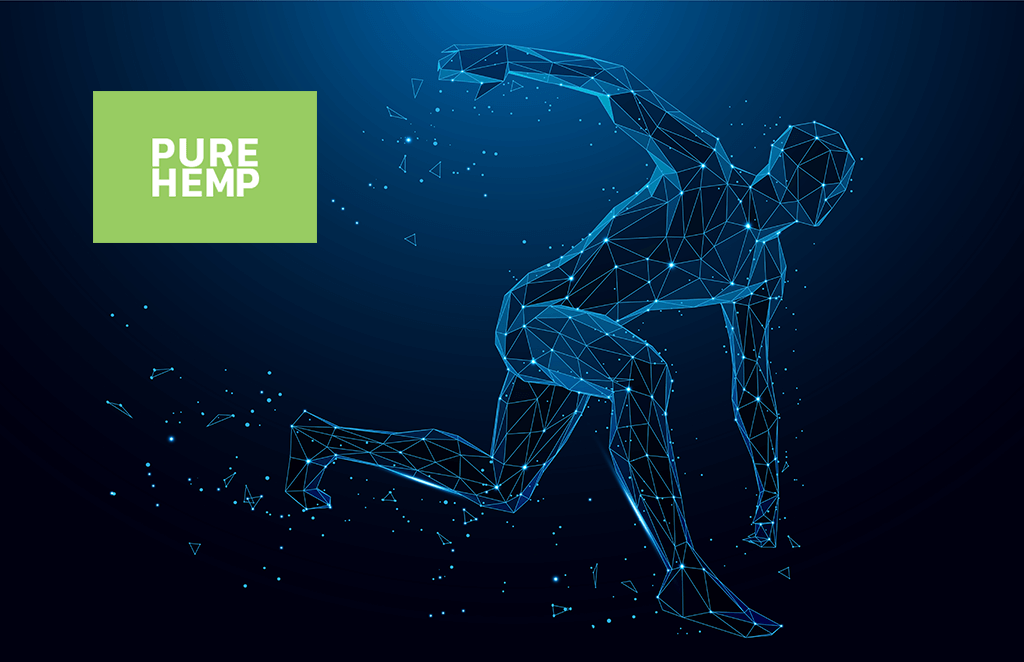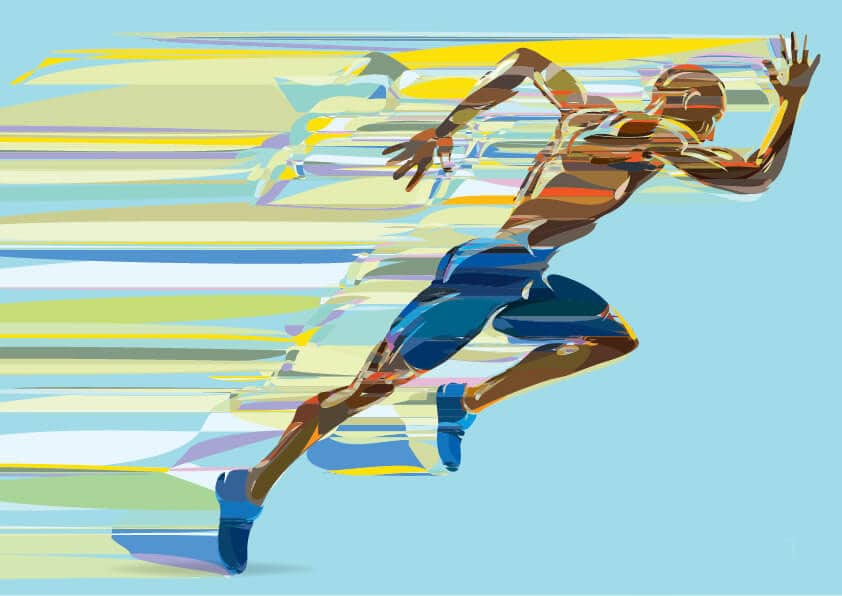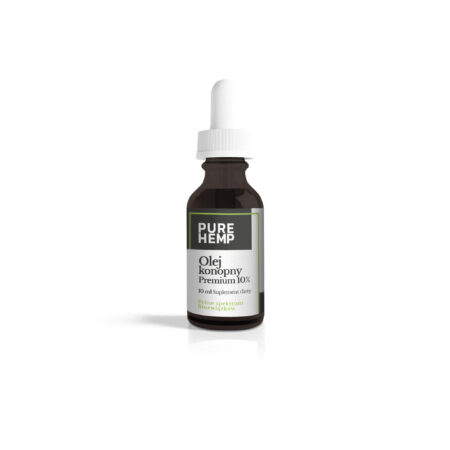CBD in sport - CBD oil for athletes
Intensive sports training is inextricably linked to the crossing of certain limits that lead to the development of strength, endurance, agility and other physical parameters. Often, it also requires an internal battle with yourself and your weaknesses, which make their strongest presence felt on a mental level. All this means that with almost every workout, your body is exposed to strong fluctuations in its overall state of balance, which is homeostasis. There is no development without effort.
Increased heart rate, rising body temperature, extreme strain on muscles, joints and skeletal system, accelerated breathing and heart rate. The whole body enters a kind of battle state. This is nothing more than an imbalance of homeostatic equilibrium, which the body naturally tries to dynamically balance in real time at the expense of increased energy expenditure.
Rest, sleep and wellness help recovery. Cannabinoid supplementation can support and facilitate a faster recovery process and minimise pain in strained body parts.
Supporting argument: The analgesic effect of CBD cannabidiol minimises the need to take, among other things, opioid analgesics or other strong pharmacological analgesics.
These arguments stemmed from accounts of athletes using CBD oil or other forms of CBD intake. Scientific studies on the use of CBD in sport (and not only) although they are arriving there are still too few to unequivocally confirm the above statements. CBD and sport is a fact, but we still have a lot to explore before we can unequivocally confirm how CBD and sport can combine for the benefit of athletes and amateur athletes.
As of 1 January 2019, CBD cannabidiol contained in forms such as CBD oil or CBD capsules are not on the list of doping substances. The World Anti-Doping Organisation has therefore acceded to the requests and appeals of the professional sports community. National anti-doping agencies have followed suit, with CBD cannabidiol appearing on the lists of banned substances as an authorised exception.
Does this mean that professional athletes in various sports can legally and safely use CBD oil? It is worth taking a close look at the situation, as it is not as clear-cut as some representatives of the hemp industry try to portray it.

CBD in professional sport
Cannabidiol CBD is the only cannabinoid approved for use in professional sport. The authorisation consists of an exception allowing its use by athletes. This is the situation as of today.
What does this mean? In a nutshell, it can be written: "CBD - YES! Other cannabinoids - NO!"
This situation raises a number of potential risks. High-quality, most effective full-spectrum hemp oil contains all the cannabinoids found in the plant. The detection apparatus used in anti-doping tests is sensitive enough to detect even trace amounts of prohibited compounds. This means that taking CBD surrounded by other cannabinoids involves risks that should not be underestimated.
THC było, jest i prawdopodobnie nadal będzie zakazane. Mimo, że jego zawartość w oleju CBD full spectrum (poniżej 0,2%) jest marginalna, to twierdzenie, że jest niewykrywalna lub że ponieważ pochodzi z legalnego, naturalnego preparatu to nie będzie podstawą do dyskwalifikacji nie ma żadnego potwierdzenia w rzeczywistości. Wykrycie THC w organizmie sportowca, niezależnie od źródła jego pochodzenia, prawdopodobnie zakończy się dyskwalifikacją.
As the story of the legalisation of CBD oil and cannabinoids by anti-doping bodies continues, the key point seems to be that there is currently no mention of any supportive or performance-enhancing effect of cannabinoids including CBD cannabidiol.
The professional sports community is lobbying for the full legalisation of these cannabinoids, which do not show intoxicating effects and their use does not involve building an unfair advantage over competitors. Instead, they show analgesic effects, improve sleep quality (which is also important for speeding up the recovery process), have a positive effect on appetite and minimise inflammation. Cannabinoids other than CBD are also included in this group, e.g. CBG (cannabigerol).
Athletes' health problems - when is it worth considering CBD use?
The most common health problems found among athletes may come as a bit of a surprise. Here is a list of them according to. "Medical Conditions in the Athlete 3rd Edition with Web Study Guide". (In bold are those health problems where CBD may prove effective, but this still needs to be clearly confirmed):
- Asthma
- Problems with body temperature regulation
- Hypertrophic cardiomyopathy (genetically determined heart disease)
- Psychiatric disorders: anxiety, panic attacks, PTSD
- Haematuria
- Deep vein thrombosis
- Food poisoning, bacterial diarrhoea and parasitic infections
- Dermatological problems resulting from insect bites
- Pregnancy (Important: we do NOT use any cannabis preparations during pregnancy or breastfeeding!) Of course, pregnancy is not a health problem, let alone a disease. Its inclusion in the list is probably due to the fact that it is a condition of the body indicating the need to interrupt a sporting career.
- Hepatitis
To sum up. CBD may prove helpful in 8 of the 10 most common health problems faced by professional athletes. If this potential is confirmed by relevant scientific studies, the word IMPROVING will be absolutely spot on here.
CBD and professional sport? It seems to have sense and logic on its side. And how did it get started? Where did the hype for CBD in sport come from?
Denver Broncos and Nate Diaz advocate for CBD legalisation
Much has been written about these stories. As a reminder:
The Denver Broncos are an American football team. Its players supplemented with CBD oil to alleviate pain and speed up recovery after training and tough games. When the CBD issue came to light and the substance was found to be on the banned list, Broncos players sent a letter to the NFL and to anti-doping organisations requesting that CBD supplements be taken off the list. In the letter, they argued not so much the efficacy of CBD as its high safety while reducing the need for dangerous opioids for pain relief.
Nate Diaz is a mixed martial arts fighter known for his fights with MMA star Connor McGregor. At one press conference, he ostentatiously vaporised CBD. Although he was fined for this, it gave him CBD media exposure and a gigantic amount of interest from other athletes and fans alike. Nate defended himself by claiming - truthfully - that he uses CBD for pain relief and anti-inflammatory purposes. It is hard to argue with the opinion of a man whose physical pain, and perhaps mental pressure, accompanies his professional career on a daily basis. Some obvious doubts arise when it comes to vaporising or smoking the dried product.
Both of these events are considered key in terms of the sports world's commitment to the legalisation of CBD in the form of CBD oil, among other things. It could be said that these were moments tying the two worlds inextricably together. CBD and sport had become a reality.
World Anti-Doping Organisation - CBD in sport (2019)
In a wave of growing popularity of CBD oil among professional athletes, and based on the quantity and argumentative quality of the requests made by the sporting community, the World Anti-Doping Organisation (WADA) has changed its position on CDB. On 1 January 2019, CBD was approved for use by athletes. This approval involves excluding CBD from the list of banned cannabinoids. Unfortunately, it is currently the only authorised cannabinoid.
So CBD is legal and can be used in professional sport without any risk.
This position of the world's most important anti-doping body means in a nutshell that CBD has no doping properties. The beneficial effects of CBD can be used by athletes all over the world.
The source of CBD for athletes remains a problematic issue. Currently, it seems that CBD in the form of a crystalline isolate (pure CBD with no surroundings of other cannabinoids) or its synthetic substitute is acceptable. Isolated CBD retains its value, of course, but its effects can and, as research to date indicates, do have a less intense and somewhat narrower effect. This situation represents a compromise and leaves the field open for further relaxation of prohibitions in the event of new relevant information on cannabinoids from the scientific world.
Polish Anti-Doping Agency (POLADA) - CBD in Polish sport

The Polish Anti-Doping Agency (POLADA) has also followed international standards. It naturally follows the recommendations of WADA. It is no different in the case of lists of banned substances in sport. The current list indicates that CBD cannabidiol can also be legally used by Polish athletes. This is very good news for all concerned, although it still does not solve the problem of using the full spectrum of cannabinoids, i.e. CBD surrounded by other health-promoting, plant-based and safe chemical compounds. Here, one should proceed very carefully in order not to expose oneself to unpleasant consequences.
CBD oil in amateur sport
Sports enthusiasts definitely have an easier life and can freely enjoy the benefits of the cannabinoids in CBD oil.
Positive reviews and even more positive accounts and anecdotes are increasing every day. Amateur athletes value CBD hemp oil for its effectiveness in
- pain relief for all types of mechanical injuries (joint and muscle pain, contusions),
- minimising muscle and joint inflammation caused by increased physical exertion,
- improving appetite to encourage sports diets,
- improving sleep quality,
- accelerating post-workout recovery,
- raising the pain threshold (this element is debatable, but it is a fact that it appears among user opinions).
Dosage of CBD oil in training
CBD oils are used both before and after training. The dosage? It depends. The dose considered effective starts as low as 5 to 10mg of CBD from full spectrum hemp oil per day. This is as little as 1-2 drops of PUREHEMP 10% CBD oil. If you can, consult the dosage with a sports doctor in your particular case. If not then the easiest way would be to start with a lower dose and possibly adjust the dose upwards after 1-2 weeks.
Important: The breakdown time of CBD from CBD oil in the body is between 6-8 hours. After this time, it stops working and remains in the body for about a week more.
This is much shorter than the cannabinoids taken in from, for example, smoking recreational cannabis (marijuana) when the chemical compounds are detectable in the body for up to 90 days after smoking a joint.
You can read more about this in the article: CBD dosage
Sources of CBD in sports training
CBD in amateur sport works well both in the form of CBD oil (full spectrum hemp oil) and in the form of ointments with cannabinoids or even CBD patches. It is worth mentioning that CBD oil can also be applied directly to the skin - the beneficial phytochemicals will be absorbed through the skin and penetrate into aching muscles or joints. I do this myself - it works.
For amateur bodybuilders using a variety of substances, including those that are not necessarily legal, to improve performance, strength and promote rapid muscle mass gain, I encourage you to read the article 'CBD oil in strength training'. In it, I describe some of the mechanisms that make CBD an essential part of training supplementation.
Who else should be interested in using CBD oil in sport? The list is long. Certainly all runners, cyclists, but also fitness and crossfit enthusiasts. CBD will prove its worth wherever improved recovery is a blessing and aches and pains resulting from strenuous training efforts are a daily occurrence.
The neuroprotective properties of CBD cannabidiol, surrounded by the full spectrum of other cannabinoids, should be considered by all amateur combat sports athletes - boxers, kickboxers, wrestlers and mixed martial arts competitors. Research shows that people who participate in contact combat sports are at higher risk of dying from dementia or other degenerative diseases (Alzheimer's, Parkinson's). If CBD protects the nervous system from excessive degeneration resulting from multiple blows and head injuries, is it worth investing in CBD oil? In my opinion, definitely yes.
CBD oil - flow and runner's euphoria effect

Do you play sport regularly? Great. Your body produces more anandamide than the body of someone who only watches sport on a TV screen. Anandamide is known as the 'molecule of elation'. And for good reason. Anandamide is a natural, brain-produced endocannabinoid. It is responsible for the regulation and proper functioning of the system endocannabinoid.
We produce anandamide the more effort we put into physical activity on a regular basis. It is responsible for, but not limited to, mental health, well-being, and during training an increase in its concentration can be experienced as the so-called flow effect, which is scientifically referred to as 'runner's euphoria'.
Flow is a very pleasant state of strong focus and increased concentration. It is said to be that absolute feeling of being here and now. In the flow state, time passes imperceptibly and tasks are completed with incredible efficiency and ease. The state of flow is also associated with a minimised sensation of pain, which is inherent in any intense, long-term physical effort.
How does this relate to CBD? Well, CBD has been proven to inhibit the enzymatic breakdown of anandamide. CBD helps to keep the concentration of anandamide in the body as high as possible. It can also intensify its effects. It is therefore logical to conclude that the use of CBD full spectrum oil in amateur sport and beyond is not only effective, but even advisable.
CBD oil in sports retirement
Retired athletes live an average of five to six years longer than non-athletes. They are also at lower risk of cardiovascular disease, heart attack or stroke. This is positive information. Very.
Unfortunately, the life of a retired athlete also comes with a whole host of other health issues. Retired athletes are one of the population groups for whom the use of CBD oil could potentially be most beneficial.
Some of the most serious health problems faced by retired athletes include:
- Mental disorders: depression and anxiety
- Chronic joint and muscle pain
- Neurodegenerative diseases: Alzheimer's, Parkinson's, dementia and memory problems (for retired contact combat sports players)
- Sleep disorders including sleep apnoea
- Overweight
- Other health problems
In each of the above-mentioned cases of health problems, full spectrum CBD oil can prove indispensable. Its extensive use is discussed in the article: CBD oil use: top 10 reasons to use cannabinoids
Can the use of CBD oil in athletes - professional, amateur and retired professionals - be beneficial? It most certainly can. Amateur and former professional athletes can reap the benefits of CBD oil without the slightest concern.
Professional athletes, however, need to think twice before choosing a source of high-quality CBD because for them, the detection of chemicals other than CBD cannabidiol carries the risk of penalties. Will this ever change? We don't know, but if the use of cbd full spectrum oil cannabinoids does not show a significant impact on building a competitive advantage in sport, and has protective and therapeutic properties then perhaps it will.
One thing is certain. CBD in sport has become a reality, and perhaps even an inseparable fusion of two worlds. As soon as the status of CBD and CBD full spectrum cannabinoid oil is clearly clarified and its usefulness for athletes finally clarified, this preparation has a great chance to become a supplement standard.
Did you like the article 'CBD in sport'? Share it with your friends!
Determined? Decided? Wondering where to buy high quality full spectrum CBD oil?
We encourage you to visit our shop and try our proven and highly reputable hemp preparations:
You can find disclaimers regarding the content published on the pages of this blog by clicking here.
